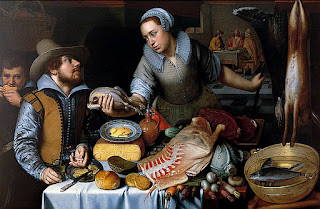
Last night I watched the film 'Oscar and Lucinda' (1997) directed by Gillian Armstrong. Set in the middle of the 19th century, it's the story of Oscar (Ralph Fiennes) the son of strict Plymouth Brethren parents and Lucinda (Cate Blanchett) an independent-minded Australian entrepreneur.
When attending Oxford reading theology, Oscar is introduced to the joys of gambling, specifically horse-racing. Frequently lucky and believing himself to be inspired by divine providence, the bumbling and socially-inept Oscar persists in donating his winnings to the poor. Meanwhile Lucinda discovers a passion for glass and purchases a Glass-works with an inheritance. Oscar and Lucinda first meet aboard a ship bound for Australia. The pretext for their meeting is ostensibly for the purpose for Lucinda's confessional, Oscar having recently been ordained and emigrating. The pair soon become friends with a shared passion for card-playing. Oscar's justification for gambling is that of the famous wager of Pascal which argues that all Christians are gambling their souls in hope of God's existence, love and redemption.
Without wanting to post spoilers, the crux of the romantic drama concerns a wager between Oscar and Lucinda of their respective inheritances, that Oscar can transport a glass Church from Sydney to Bellingen on the North-west coast of New South Wales, a journey which involves the crossing of no less than six rivers and hazardous terrain.
Based upon the Peter Carey novel which won the 1988 Booker prize, 'Oscar and Lucinda' is a film which established Cate Blanchett's acting career. The other notable star of this film is, as with 'Picnic at Hanging Rock' (Dir. Peter Weir 1975), the stunning Australian scenery. 'Oscar and Lucinda' also highlights the basic living conditions of the early Australian colonists.
The residue of Protestant ethics continues to associate gambling as a sin, even among those whose morality is no longer determined by Christian ethics whatsoever. This is primarily due to the fact that during the 18th century a day at the races spent gambling was viewed as a threat to the established social order. A Lord attending Newmarket races could by the day's end be a pauper and a pauper could acquire the wealth equivalent to a Lord. Primarily for this reason alone, the notion of acquiring wealth without industriousness, circumventing the Protestant work-ethic, preachers railed from the pulpit against the 'sin' of gambling. And to be fair, there is a scene in the film which highlights the very worst consequence of ruination from gambling, namely, suicide. However, as Oscar fully realises, many aspects of life and love are in fact far from being certainties, but very uncertain gambles in most lives.
At the present time of writing the author Peter Carey, who has won the Booker prize twice, is priced at 5-1 to win the Booker again, with the Greek-Australian Christos Tsiolkas, author of 'The Slap', priced at a 9-1. Personally, I'm considering having a small bet that Carey wins the Booker Prize for an unprecedented third time. Just don't put your shirt on it !






































